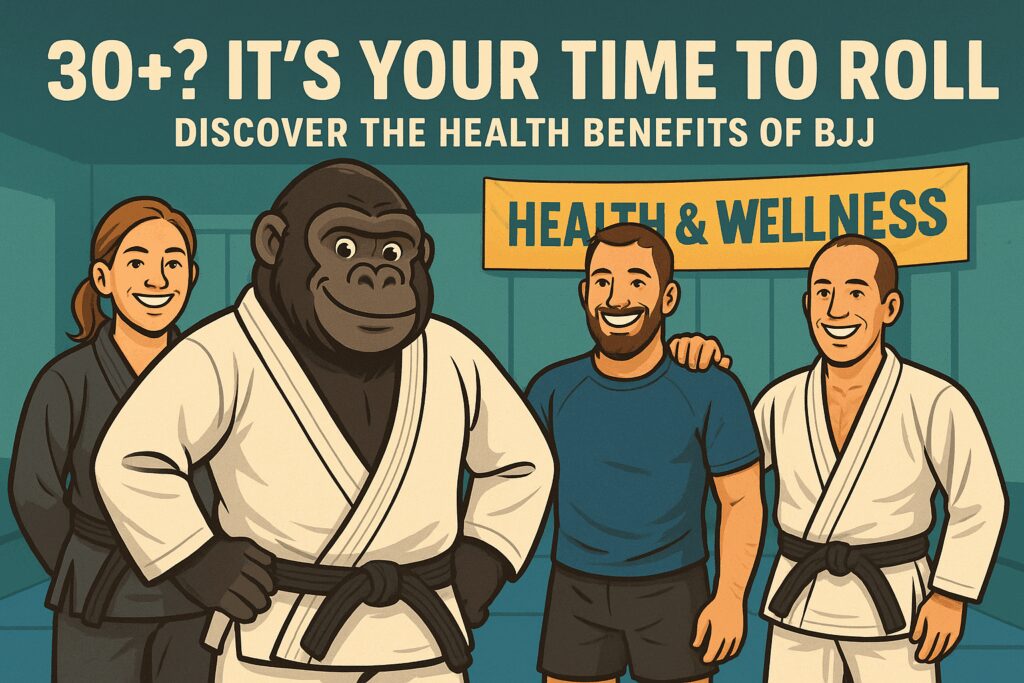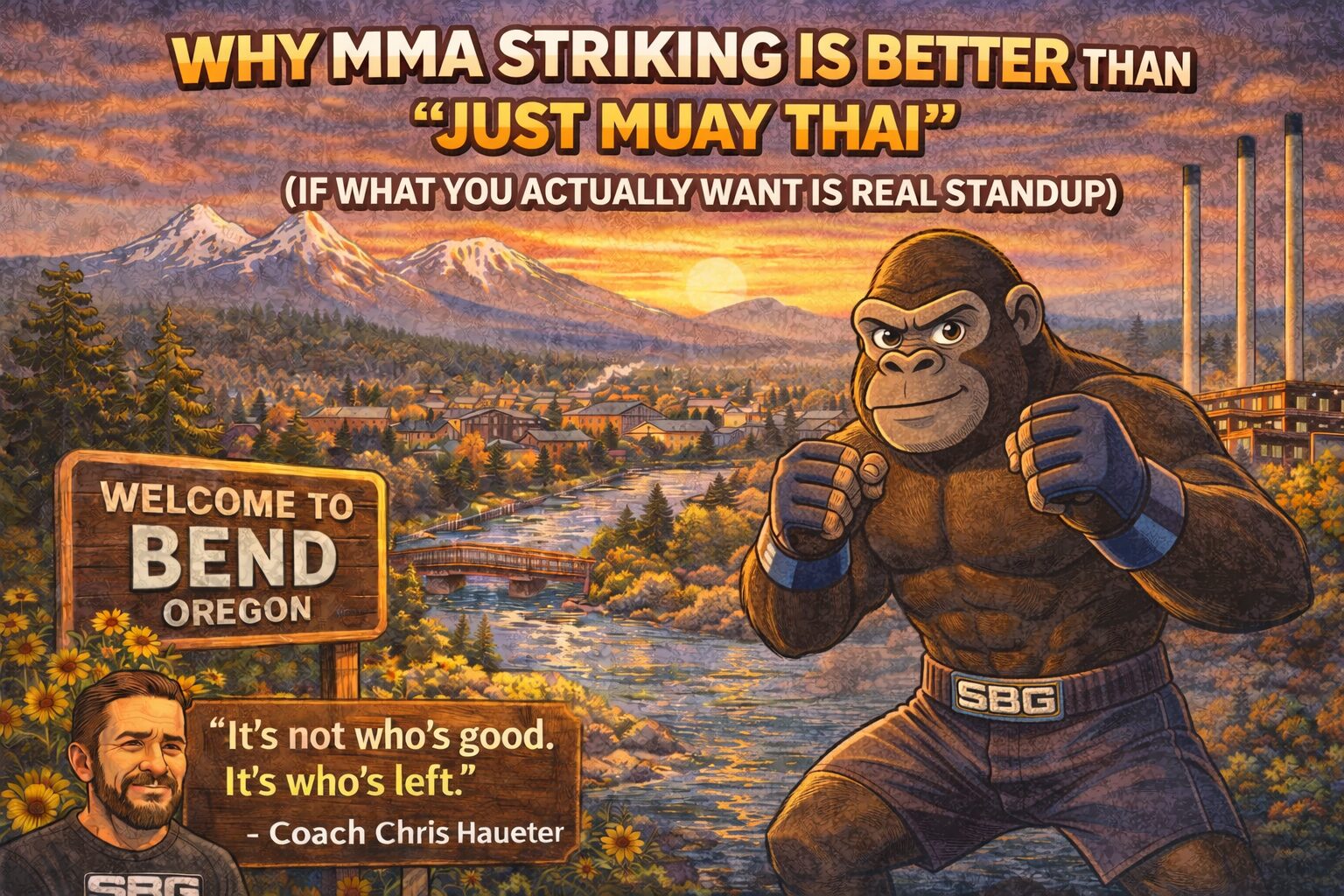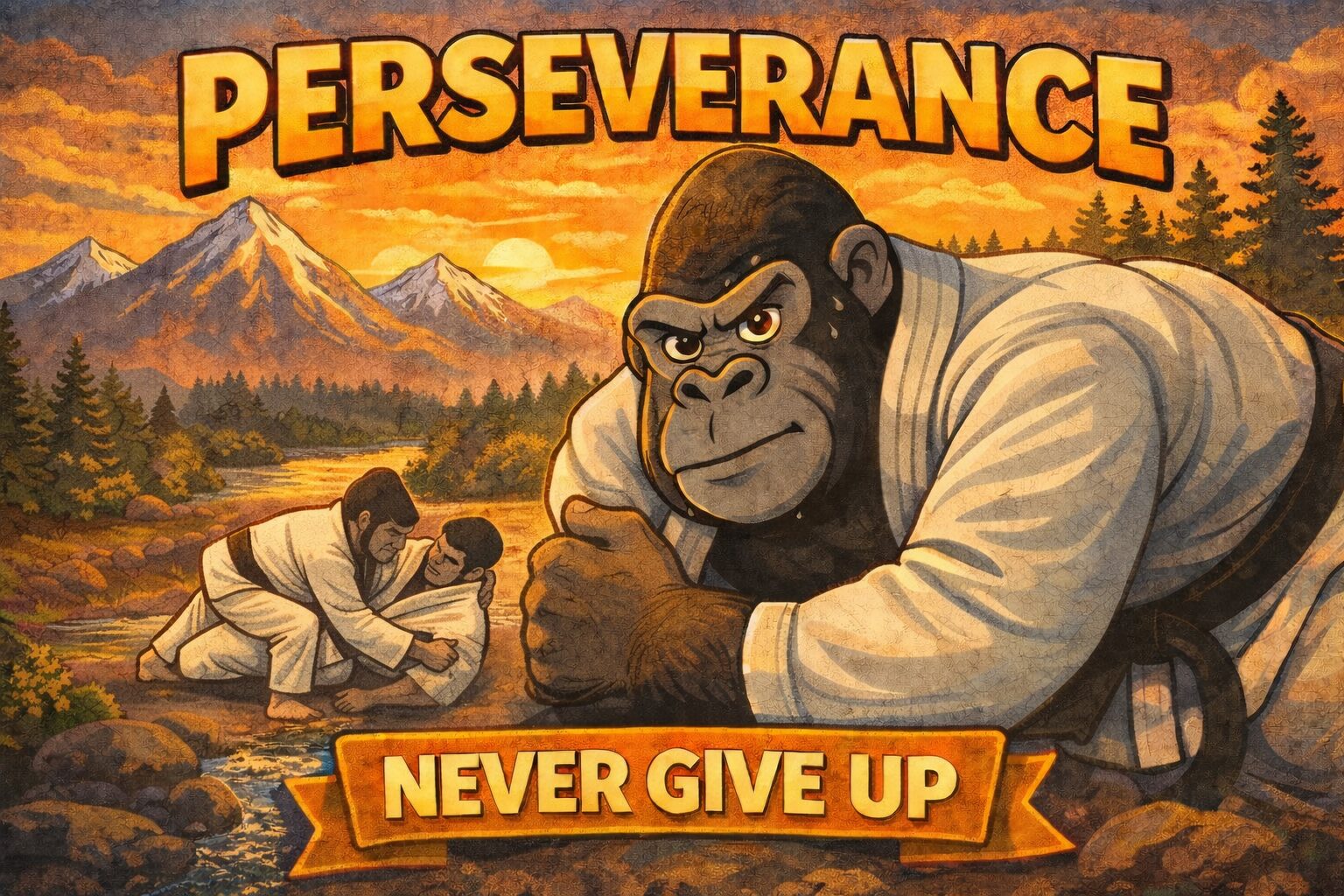
Jiu Jitsu – Not Just for the Young Guns: If you’re in your 30s, 40s, or beyond in Bend, Oregon, you might think Brazilian Jiu-Jitsu is a young person’s game – something only college kids or pro fighters do. Think again! BJJ is quickly becoming the go-to hobby for adults 30 and up who want to get in shape, relieve stress, and engage their mind. At SBG Bend, a significant chunk of our tribe is 30+ (including plenty of folks in their 40s and 50s), and they’ll be the first to tell you: Jiu Jitsu isn’t just a hobby, it’s a lifestyle with profound health benefits. In fact, the average BJJ practitioner these days is around 30 years old – and for good reason. As we get older, we start prioritizing activities that offer multiple benefits at once. BJJ checks all the boxes: it’s a workout, a learning experience, a social outlet, and a mental boost. Let’s explore why taking up Brazilian Jiu-Jitsu in your “adult” years might just be the best decision you ever make for your health and well-being.
Full-Body Fitness (Without the Tedium)
Tired of the monotonous gym routine or long solo runs? BJJ provides a full-body workout that is anything but boring. A typical class will get your heart pumping and engage muscles you didn’t even know you had – all while you’re so focused on the fun of training that you hardly notice the exercise. BJJ involves movements like pushing, pulling, lifting, and squatting as you and your partner practice techniques, so you’re naturally building functional strength and endurance.
According to fitness experts, grappling-based training improves cardiovascular endurance as effectively as high-intensity interval workouts. Every roll (sparring round) is like a mini HIIT session – you exert, recover, exert, recover. Over time, this can lead to improved heart health and stamina. Many of our 30+ students report dropping weight, gaining muscle tone, and feeling in the best shape since their 20s after a year of consistent BJJ.
Unlike lifting weights or running on a treadmill, where it’s easy to plateau or lose motivation, BJJ constantly challenges your body in new ways as you learn techniques. One day you’re working your core escaping mount, another day you’re feeling the burn in your legs from holding guard. It’s a full-body workout that keeps evolving with your skills. Plus, you’ll develop functional fitness – the kind of strength and agility that’s useful in real life (carrying groceries up stairs, playing with your kids, etc.), not just for show.
Flexibility and Mobility
Ever notice how kids can pretzel themselves into any position and bounce back? As we age, our muscles and joints stiffen – unless we actively work on flexibility. BJJ can gently push your flexibility limits in a beneficial way. You’ll gradually loosen tight hips and shoulders through techniques that require range of motion. Warm-ups at SBG Bend often include movements borrowed from yoga and gymnastics (like shrimping, bridging, and technical stand-ups) that improve your mobility. Over time, many 30+ practitioners find they regain a lot of the flexibility they thought was lost.
A flexible body is less prone to injury in daily life – you’ll handle that slip on the Bend ice in winter better if you’ve been training BJJ, trust us! And if you do love outdoor sports (as many Bend folks do – skiing, mountain biking, etc.), the increased mobility and core strength from Jiu Jitsu will be a huge asset. We’ve had members mention how their skiing posture or cycling endurance improved thanks to hours spent building hip mobility and breath control on the mats.
Weight Management and Metabolic Health
As metabolism slows with age, keeping off extra pounds becomes a challenge. The good news is BJJ is a calorie torcher. An hour of rolling can burn anywhere from 500 to 700 calories, depending on intensity. Because it’s engaging and skill-oriented, people tend to train BJJ more frequently and consistently than they might hit the gym. It’s just more fun to grapple with friends than to do solitary cardio. The consistency and intensity combine to help with weight loss or maintenance. We’ve seen busy professionals shed 20-30 lbs in a few months just by swapping a couple of usual after-work sedentary evenings for BJJ class.
Moreover, BJJ builds lean muscle mass (especially core and lower body), which in turn boosts your resting metabolism – meaning you burn more calories even when not training. Beyond weight, BJJ can improve other aspects of metabolic health. Regular exercise helps regulate blood sugar and can improve insulin sensitivity. Several of our members in their 40s have reported better medical check-ups: lower blood pressure, improved cholesterol numbers, etc., crediting their lifestyle change to include BJJ. It’s not magic – it’s the cumulative effect of vigorous exercise, stress reduction, and being more mindful of health (because once you start training, you often start eating and sleeping better to support it). BJJ truly can kickstart a healthier lifestyle cascade.
Joint Health and Longevity
A concern many people over 30 have is, “Won’t grappling be hard on my joints?” It’s true any physical activity carries risk, but with proper technique and our safety-first culture (remember that no-ego tapping early mindset), BJJ can actually strengthen your joints. Gentle pressure on joints (through controlled ranges in techniques) stimulates them to adapt and get stronger, much like muscles do. You’ll likely develop stronger stabilizer muscles around knees, shoulders, and core, which can protect you from injuries in everyday tasks.
Additionally, by learning how to fall correctly and move your body efficiently, you might avoid common injuries. For example, in BJJ you often learn breakfalls (how to fall without hurting yourself) – a skill that has saved more than one of our students from injury when they took a spill while hiking or slipped on a slick floor. And while you will experience normal soreness as you would from any workout, it’s the good kind of soreness that tells you your body is adapting and getting stronger.
We often see our 40+ students especially celebrate victories like “I can squat down to play with my toddler without discomfort now” or “My chronic back pain is gone since I strengthened my core through BJJ.” Of course, listening to your body is key – we encourage older students to pace themselves and communicate with training partners. Thankfully, at SBG Bend our culture is very accommodating: if you say “Hey, my shoulder’s a bit tender today, can we go light?”, people will gladly oblige. That’s how you make BJJ a sustainable, long-term activity and reap its benefits well into your later decades.
Mental Health and Stress Relief
The health benefits of BJJ are not just physical – mental well-being is a huge part of the lifestyle. By 30+, life can be stressful with careers, family, mortgages, and more. BJJ provides an incredible stress outlet. When you’re sparring, you can’t focus on anything but the present moment – it’s essentially an active form of mindfulness. This break from life’s worries does wonders for your mental state. You release pent-up tension during training, and you leave class with a clearer, calmer mind (thanks endorphins!). Many of our adult students call BJJ “therapy you can sweat out.” It’s a time where you’re not an employee, not a parent, not thinking about bills – you’re just you, learning and exerting yourself.
Over time, BJJ also builds confidence and reduces anxiety. Knowing that you can handle yourself, that you’re continuing to improve in a challenging art, gives a sense of accomplishment that carries over outside the gym. Some even find that the deep breathing and focus required in grappling resemble meditation in motion – it regulates the nervous system. There’s research indicating exercise like BJJ can help reduce symptoms of anxiety and depression. And of course, there’s the social aspect: you’re part of a community (remember One Tribe, One Vibe?) and that camaraderie is a known protective factor for mental health. It’s hard to feel isolated or stuck in your own head when you’re laughing with teammates after class and sharing the struggles and triumphs on the mat.
Cognitive Sharpness and Learning
Another often overlooked benefit of BJJ for the 30+ crowd is how it keeps your brain sharp. Jiu Jitsu has been called “physical chess” – every roll and every technique learned is like solving a complex puzzle. You have to think, plan, and adapt constantly. For adults who maybe haven’t learned a new skill in a while, this can be incredibly stimulating. It’s like learning a new language for your body and brain. Studies on lifelong learning show that picking up new complex hobbies can improve memory and cognitive function as we age. We’ve had students express that BJJ improved their focus and problem-solving outside the gym: tackling a tough work project or dealing with unexpected challenges becomes easier after you’ve trained your mind to stay calm while a 200-lb person is trying to choke you!
The strategy element of BJJ – figuring out setups, tricking an opponent, sequencing moves – keeps your mind engaged. Unlike routine exercise, there’s always something new to learn or refine in Jiu Jitsu, which makes it endlessly interesting. This mental engagement is what turns BJJ from just a workout into a lifestyle and passion. You’ll find yourself watching instructional videos, thinking about a move on your drive home, or excitedly recounting a sparring round where you solved a problem. It’s brain candy, and that mental stimulation is fantastic for keeping you young at heart and quick-witted.
Adaptable Intensity – Go at Your Pace
One of the beauties of BJJ is that it’s highly scalable to different ages and fitness levels. At SBG Bend, we have “Micro Monkey” kids as young as 4 and students in their 50s and 60s – each can train appropriately for them. If you’re 35 and just starting, you might train 2 days a week and roll at moderate intensity as your body adapts. That’s perfectly fine. You’ll still see gains. BJJ isn’t all or nothing; even a couple sessions a week bring benefit. As you get comfortable, you can increase frequency if desired. But you don’t have to train like you’re preparing for the World Championships to enjoy it.
Some of our 30+ members love competing and roll very hard, others treat BJJ as an easy-going recreational activity – both approaches are valid here. Because BJJ sparring has the tap-out mechanism, you can always regulate your own training. If you feel tired or something doesn’t feel right, you tap or pause. Everyone understands. This means you can train longer and more often than in high-impact sports that have no “pause” (e.g., you can’t tap out of a 5k run if tired – you must finish, which can lead to pushing too far). The key is consistency, not intensity. Over time, consistent training even at moderate intensity yields major health improvements. We emphasize listening to your body and using technique over brute force – which naturally benefits the older, wiser grappler! You’ll quickly learn to leverage angles and leverage instead of athletic explosiveness. That technical style not only spares your body unnecessary wear, but it often frustrates younger, more athletic opponents – a nice ego boost for the older folks, truth be told.
Role Models: BJJ is a Lifelong Journey
If you need proof that BJJ can be done for life, look at the legends. Helio Gracie, one of the founders of BJJ, practiced well into his 90s and famously said, “Jiu-Jitsu is for the protection of the individual: the older man, the weak, the child, the lady, and the young woman.” In our own SBG tribe, we have black belts in their 50s and 60s still rolling regularly. Coach Chris Haueter (mentioned earlier) is in his late 50s, still on the mats teaching and sparring with people half his age. The Masters divisions in BJJ competitions go up to 60s and beyond – there are tournaments with brackets for “Masters 7” (roughly age 60+).
So yes, this is truly an art you can practice for decades. Starting at 30 or 40 is by no means too late; in fact, it’s a perfect time because you likely have the patience and discipline to appreciate the art deeply. Many people who start in their 30s find they have a healthier approach to training than they might have in their teens – they listen better, they don’t let ego drive them into bad spots (we hope!), and they often become very technical. We’ve seen 50-year-olds fold up 25-year-olds like pretzels purely with timing and technique. It’s inspiring and shows that skill and knowledge in BJJ can overcome youth and strength.
So rather than thinking of BJJ as a brutal sport, think of it as a skill-building craft, akin to a martial arts version of chess or skiing – something you can keep refining.
Community and Social Health
Let’s not forget, health isn’t just physical metrics; it’s also about having a support system and friends. As an adult, it can be hard to make new friends or find time to socialize. Joining a BJJ gym like SBG Bend instantly immerses you in a friendly community. You’re sweating and learning together, which forges quick bonds. For many in the 30+ crowd, the gym becomes a second family – a positive, health-oriented peer group. Instead of meeting friends for drinks and sitting around (nothing wrong with moderation there, but it can add up), you’re meeting up to train and improve yourselves.
The conversations in the locker room might start about technique but often extend to sharing life advice, work anecdotes, etc. It’s a rich social environment. Good social health – having friends and feeling part of a community – has been shown in studies to increase longevity and happiness. And since BJJ is a lifestyle, you’ll find it often extends beyond the mats: teammates might start doing other healthy activities together (going on hikes, doing yoga, etc.), and encouraging each other to keep accountable with nutrition or weight goals. It’s easier to lead a healthy life when you’re surrounded by others on a similar path. Our 30+ members often say they feel 10 years younger not just physically, but mentally, because they’re having fun and goofing around with their mat friends like they did when they were kids playing sports.
Making BJJ Your Lifestyle
“Hobby to lifestyle” isn’t hype – it happens naturally. You start coming to class a couple times a week to learn some moves and get a workout. Fast forward a bit, and you realize BJJ has become the highlight of your week. You arrange work schedules to make class, you find yourself watching UFC fights or YouTube techniques, you talk the ear off your spouse about this cool choke you learned (sorry, spouses!). Your wardrobe starts including more stretchy pants and maybe that one favorite rashguard. It’s not that BJJ takes over your life in a bad way, it just integrates into who you are. And that’s a good thing because it’s a positive force – it keeps you fit, centered, and socially connected.
So if you’re in Bend and over 30, don’t think for a second you missed the window to train martial arts. On the contrary, this is your time. You have the maturity to appreciate the journey, and your body will thank you for the diverse exercise. Brazilian Jiu-Jitsu can truly be the fountain of youth – keeping your body capable and your mind sharp well into your later years. It’s never too late to start; the only regret we hear is “I wish I started earlier” – which for you means today is better than tomorrow!
Ready to make BJJ not just a hobby, but part of a healthier lifestyle? Come try a class at SBG Bend. Our Fundamentals program is perfect for those getting into it later in life. You’ll train with other adults, many likely in the same boat, in a supportive setting. We’ll help you ease in, set goals, and before you know it, you’ll be hooked on the art. Remember, “A black belt is just a white belt who never quit” – and that journey can start at any age. Whether you’re 34 or 54, if you don’t quit, you’ll reap all these benefits and more.
Embark on the lifestyle: Contact SBG Bend to schedule your free intro and see first-hand the positive impact BJJ can have on your health. It’s time to invest in you – body, mind, and spirit – through the gentle art of Brazilian Jiu-Jitsu. Get on the mats, and welcome to a healthier, happier you!





